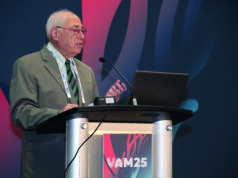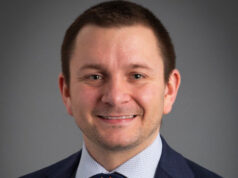The United States Preventive Services Task Force (USPSTF) recently issued a draft document recommending against screening for carotid artery disease in asymptomatic patients.
The draft implies that ultrasonography in the general population, where carotid artery stenosis prevalence is low, yields “many false-positive results.” Moreover the USPSTF concludes that there is “adequate evidence” that both testing for carotid artery stenosis and treating carotid artery stenosis “can cause harm.”
How is it that a test most vascular surgeons consider reliable can be so inaccurate on a national level? How can screening duplex ultrasonography have such a negative impact? I believe that the answer is simple. It is not that the test is flawed or that the treatment is overly risky. It is that those who perform the tests and subsequent interventions are not vascular surgeons. Vascular surgeons pioneered ultrasound evaluation of the carotid artery and, for the most part, continue to offer reliable tests and subsequent treatments. However, over the past few years, we have become marginalized. Now entrepreneurs run mobile labs often using outdated equipment and poorly supervised technologists. They wheel their machines into primary care doctors’ offices for the day, where patients who do not need testing are nevertheless scanned. The scans are then read offsite by who-knows-who with inexact results commensurate with the poorly performed studies. I suspect that many of these tests are not even interpreted by a physician who simply rubber stamps the technologist’s preliminary study. No wonder the USPSTF has its concerns.
It is not only the mobile labs that are the problem. Family practice clinics are also investing in machines and relying on a technologist’s interpretation. Some podiatrists are now advertising that they are experts in evaluating lower-extremity ischemia and venous disease. Believe it or not, their competition comes from gynecologists and orthopedists. Cardiologists seem to be more interested in carotid and lower-extremity arteries than the coronaries. Further, having direct control of the patient and the interpretation of an ultrasound test, it becomes relatively straightforward for them to “justify” a carotid artery stent.
Vascular surgeons and registered vascular technologists have endeavored to refine diagnostic parameters that will improve the accuracy of these tests. Most use the best equipment and attend many hours of continuing education. They voluntarily go through the arduous process of having their vascular lab certified by the Intersocietal Accreditation Commission so as to be sure that they are providing optimal services and accurate diagnoses. Dr. Eric Topol, a noted cardiologist, has begun promoting the concept of an ultrasound that can be attached to an iPhone.
The question, however, is whether an untrained physician using an inexpensive hand-held ultrasound can still make an accurate diagnosis. And will this test be reimbursed no matter what the quality, or the outcome of such a study on the patient?
Fortunately those “I-Sound” devices may still be far off in our future. However, even now, surgeons will have a patient referred to them for treatment of a critical carotid stenosis that they cannot replicate with a confirmatory ultrasound in their own lab. This has become so common an occurrence that our group always repeats the outside test. In so doing, we run the risk of antagonizing the referring doctor, confusing the patient, and being told by the insurance program that we are performing an unnecessary reevaluation. To add insult to injury, we are usually not paid for this confirmatory test. It appears that insurance carriers would rather pay for an unnecessary endarterectomy or stent, with the possibility of stroke or death, rather than pay for a repeat test that might have prevented the procedure in the first place.
In an upcoming edition of Vascular Specialist, we will provide a “Point-Counterpoint” discussion on the value of screening for carotid disease and the merit of the USPSTF document. But, in the meantime, what are we to do about these subpar labs, their nondiagnostic tests and subsequent unnecessary and poorly performed interventions? Can we really stop this abuse? I believe we can. As I mentioned, we already have an accreditation body to evaluate diagnostic vascular facilities.
What we need to do is convince insurance companies and the Centers for Medicare & Medicaid Services that only certified labs should be permitted to carry out these studies. Further, only trained, certified specialists should be allowed to perform carotid stenting and carotid artery surgery. Finally, we need to educate patients that all tests are not generic. They should insist on having their carotid artery ultrasounds carried out by a vascular surgeon or, at the very least, having it done in an accredited vascular lab.













